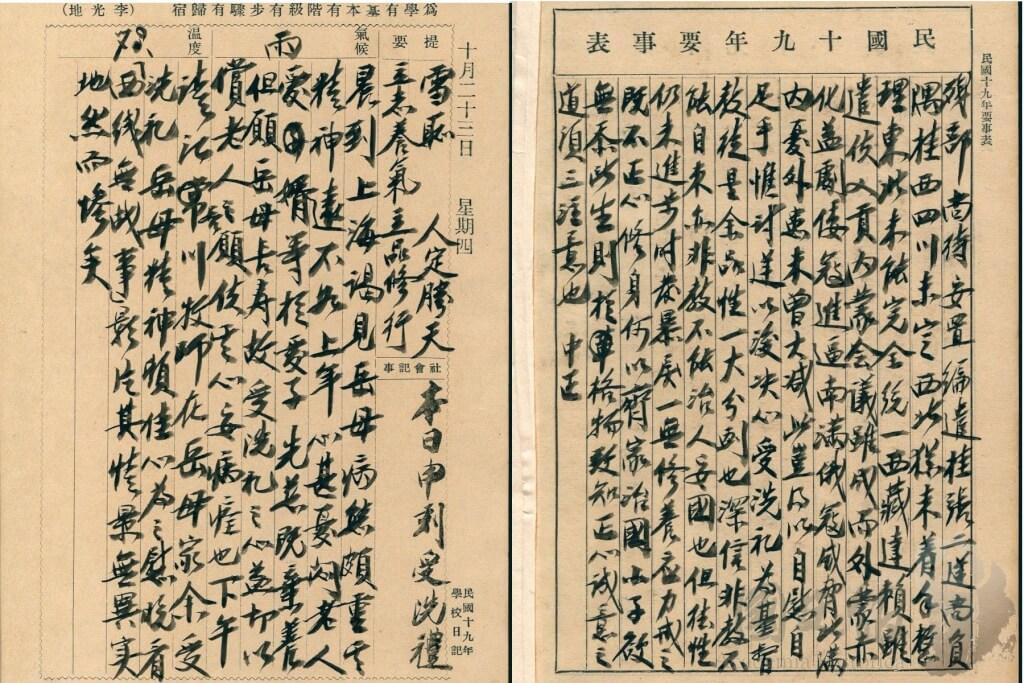Academia Historia today announced that it has published the fourth batch of diaries kept by former presidents Chiang Kai-shek (蔣介石) and Chiang Ching-kuo (蔣經國).
The diaries are part of a collection formerly kept at Stanford University that were returned to Taiwan in September last year after a long legal battle over their ownership.

Photo courtesy of Academia Historia via CNA
Since their return, Academia Historia has been digitizing them and making them publicly available in chronological order.
The fourth set materials includes Chiang Kai-shek’s diaries from 1930 to 1933, totaling 1,481 items and 2,214 digital files, and Chiang Ching-kuo’s diaries from 1943 to 1944 totaling 1,014 items and 1,253 files, Academia Historia said in a news release.
Chiang Kai-shek’s documents include one original volume and three transcribed volumes, while the Chiang Ching-kuo collection stands at two original volumes, it said.
While the items are currently accessible and searchable, they would not be available online until the copyright expires, although they can be accessed directly in Academia Historia’s reading room, it added.
Since March, 34 volumes covering 24 years and 16,138 digital files have been published.
The diaries are organized chronologically, with files clarifying whether each is a full or partial entry, if there is a missing page or if it has content that has yet to be understood.
The 1930 diaries include Chiang Kai-shek’s decision to be baptized, with him citing his mother-in-law’s illness as the motivating factor.
In addition to writing their respective diaries, both Chiangs also read one another’s entries, Academia Historia said.
Today’s batch is the earliest published so far.
Academia Historia has already published Chiang Kai-shek’s diaries from 1948 to 1972, in three groups from 1948 to 1954, 1955 to 1960, and 1961 to 1972.
It has also published Chiang Ching-kuo’s diaries from 1960 to 1969 and from 1970 to 1979.

Prosecutors in New Taipei City yesterday indicted 31 individuals affiliated with the Chinese Nationalist Party (KMT) for allegedly forging thousands of signatures in recall campaigns targeting three Democratic Progressive Party (DPP) lawmakers. The indictments stem from investigations launched earlier this year after DPP lawmakers Su Chiao-hui (蘇巧慧) and Lee Kuen-cheng (李坤城) filed criminal complaints accusing campaign organizers of submitting false signatures in recall petitions against them. According to the New Taipei District Prosecutors Office, a total of 2,566 forged recall proposal forms in the initial proposer petition were found during the probe. Among those

ECHOVIRUS 11: The rate of enterovirus infections in northern Taiwan increased last week, with a four-year-old girl developing acute flaccid paralysis, the CDC said Two imported cases of chikungunya fever were reported last week, raising the total this year to 13 cases — the most for the same period in 18 years, the Centers for Disease Control (CDC) said yesterday. The two cases were a Taiwanese and a foreign national who both arrived from Indonesia, CDC Epidemic Intelligence Center Deputy Director Lee Chia-lin (李佳琳) said. The 13 cases reported this year are the most for the same period since chikungunya was added to the list of notifiable communicable diseases in October 2007, she said, adding that all the cases this year were imported, including 11 from

China might accelerate its strategic actions toward Taiwan, the South China Sea and across the first island chain, after the US officially entered a military conflict with Iran, as Beijing would perceive Washington as incapable of fighting a two-front war, a military expert said yesterday. The US’ ongoing conflict with Iran is not merely an act of retaliation or a “delaying tactic,” but a strategic military campaign aimed at dismantling Tehran’s nuclear capabilities and reshaping the regional order in the Middle East, said National Defense University distinguished adjunct lecturer Holmes Liao (廖宏祥), former McDonnell Douglas Aerospace representative in Taiwan. If

The Mainland Affairs Council (MAC) today condemned the Chinese Communist Party (CCP) after the Czech officials confirmed that Chinese agents had surveilled Vice President Hsiao Bi-khim (蕭美琴) during her visit to Prague in March last year. Czech Military Intelligence director Petr Bartovsky yesterday said that Chinese operatives had attempted to create the conditions to carry out a demonstrative incident involving Hsiao, going as far as to plan a collision with her car. Hsiao was vice president-elect at the time. The MAC said that it has requested an explanation and demanded a public apology from Beijing. The CCP has repeatedly ignored the desires